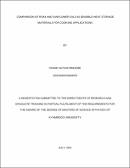Comparison of roki and sunflower oils as sensible heat storage materials for cooking applications
Abstract
Sensible heat storage materials are cheaper than latent heat storage materials for small storage
volumes. Static experiments to evaluate the thermal performances of two Ugandan locally
available edible vegetable cooking oils for medium temperature thermal energy storage are
presented. The two vegetable oils evaluated and compared are Sunflower oil and Roki oil (a blend
of Palm oil and Sunflower oil). Temperature profiles are used to assess the thermal performances
during heating cycles, cool-down cycles, energy, exergy, and heat utilization. The results show
that Roki oil attains a higher maximum temperature (~ 170 ℃) compared to the Sunflower oil (~
160 ℃) during low-temperature heating cycles. Roki oil shows higher temperatures during cooling
compared to Sunflower oil, achieving a final temperature (~ 78 ℃) slightly higher than that of
Sunflower oil (~ 76 ℃). Roki oil shows a maximum energy rate of 413 W compared to Sunflower
oil showing a maximum energy rate of 387 W, this is possibly due to the low thermal mass (mc)
of Roki oil compared to Sunflower oil. Roki oil also shows higher maximum exergy rate of ~ 129
W compared to that of Sunflower oil ~ 120 W. This occurs because of the lower thermal mass
(mc) of the Roki oil which leads to a quick rise of temperature. The exergy factor of Roki oil (0.31
– 0.62) is slightly higher than Sunflower oil (0.27 – 0.59) within 1 hour and 40 minutes. This is
possibly due to the higher difference in temperature of Roki oil compared to Sunflower oil. The
heat utilization characteristics of the two heat storage materials are experimentally determined in
water heating experiments using 1.0 kg to 3.0 kg water loads. Roki oil shows higher average heat
utilization (151 – 350) kJ, and higher average heat utilization efficiency values (0.25 – 0.66) as
compared to Sunflower oil (148 – 300) kJ and (0.25 – 0.60), respectively. The average heat
utilization and average heat utilization efficiency values increase with the increase in the water
load for both Sunflower oil and Roki oil. The best overall performance is shown by Roki oil
compared to Sunflower oil. Preliminary results with parabolic dish solar cookers are also presented
in this work. The results show that Roki oil performs better than Sunflower oil during heating,
cooling/heat retention, and heat utilization.

